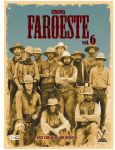Publicidade
Publicidade
Pesquisa mostra baixa popularidade do MST, diz embaixada; leia em inglês
Publicidade
DE SÃO PAULO
ID 58104
Date: 3/24/2006 18:51
06SAOPAULO332
Consulate Sao Paulo
UNCLASSIFIED//FOR OFFICIAL USE ONLY
Veja como funciona o WikiLeaks
Veja as principais revelações do WikiLeaks
Leia a cobertura completa sobre WikiLeaks
Leia íntegra dos arquivos do WikiLeaks obtidos pela Folha
VZCZCXRO1379OO RUEHRGDE RUEHSO #0332/01 0831851ZNR UUUUU ZZHO 241851Z MAR 06FM AMCONSUL SAO PAULOTO RUEHC/SECSTATE WASHDC IMMEDIATE 4765INFO RUEHBR/AMEMBASSY BRASILIA 5916RUEHRG/AMCONSUL RECIFE 2799RUEHRI/AMCONSUL RIO DE JANEIRO 6939RUEHBU/AMEMBASSY BUENOS AIRES 2121RUEHAC/AMEMBASSY ASUNCION 2468RUEHMN/AMEMBASSY MONTEVIDEO 1884RUEHSG/AMEMBASSY SANTIAGO 1629RUEHLP/AMEMBASSY LA PAZ 2673RHEHNSC/NSC WASHDCRUMIAAA/USCINCSO MIAMI FLRUEHRC/USDA FAS WASHDC 0609RUCPDOC/USDOC WASHDC 2338RUEATRS/DEPT OF TREASURY WASHDCRUEHC/DEPT OF LABOR WASHDC
UNCLAS SECTION 01 OF 03 SAO PAULO 000332 SIPDIS NSC FOR SCRONIN STATE PASS USTR MSULLIVAN/KLEZNY DEPT FOR WHA/BSC, DS/IP/WHA, DS/DSS/ITA DEPT OF TREASURY FOR FPARODI USDOC FOR 332/ITA/MAC/WH/OLAC/JANDERSEN/ ADRISCOLL/MWARD USDOC ALSO FOR 3134/USFCS/OIO/EOLSON/ DDEVITO/DANDERSON DOL FOR ILAB MMITTELHAUSER SENSITIVE SIPDIS E.O. 12958: N/A TAGS: EAGR, PREL, ELAB, PGOV, PHUM, ECON, SOCI, ASEC, BR SUBJECT: LANDLESS MOVEMENT'S EARLY YEAR ACTIVITIES LEAD WAY TO ANNUAL "RED APRIL" REF: A) 05 Sao Paulo 554 AND PREVIOUS B) 05 Brasilia 2692 SUMMARY
-------
1. (SBU) Land invasions led by the Movimento dos Trabalhadores Rurais Sem Terra (Landless Rural Workers Movement - MST) and allied groups have begun in the Sao Paulo Consular District (southern and part of southeastern Brasil) in anticipation of the annual Red April protests (ref A). Early March MST activity has occurred nationwide, with a number of invasions in Sao Paulo, Parana, Rio Grande do Sul, and Mato Grosso do Sul states since the beginning of the year. Two thousand members of a women's movement apparently allied with MST gained extensive and negative press coverage for their destruction of private agribusiness property, including seedlings, research results, and laboratory facilities, valued at USD 400,000. Despite an active early year, "Red April" of 2005 in the Sao Paulo Consular district was relatively quiet, in deference to the recently deceased Pope John Paul II and in preparation for the nationwide protest march that occurred in May 2005. There are clear indications, however, that invasions and protests in 2006 will be more vigorous. END SUMMARY.
EARLY YEAR INVASIONS
--------------------
2. (U) The first months of 2006 have seen a spate of land invasions in the Pontal do Paranapanema in the far west of Sao Paulo state, and in Rio Grande do Sul, BrazilQs southernmost state. On January 7, the MST conducted its largest land invasion since 2003 in the Pontal, as over 500 landless workers invaded eight farms. According to the invasion coordinator, Vagumiar Nunes, the January action was a protest against the broken promises of Sao Paulo Governor (and now opposition presidential candidate) Geraldo Alckmin, who, during his gubernatorial campaign in 2002, pledged to "settle" 1,400 landless families. (NOTE: The Pontal region has traditionally been a focus of land disputes due to a history of forged land deeds and illegal sales of property, resulting in possession of the land by now wealthy and established farmers. In some cases, the state has sought to reclaim title, and the ambiguity is exploited by MST. END NOTE) In Rio Grande do Sul, the 2,000 landless workers occupying a 7,000 hectare ranch, Fazenda Coqueiros, received word that they will have to depart, by order of civil judge Orlando Faccini Neto. The current occupation of Fazenda Coqueiros is the fourth invasion of the property since 2004. (NOTE: Brigadier Colonel Waldir Cerutti reportedly stated that nearly 600 military police would be needed to oust the occupiers. END NOTE.)
3. Allied with the QVia CampesinaQ Rural Movement and foreign NGOs, MST has registered the largest SAO PAULO 00000332 002 OF 003 number of early-year land invasions in the past five years. (NOTE: In an interesting March 9 photo in the large-circulation daily QO Estado de Sao Paulo,Q MST leader Joao Pedro Stedile is seen at a demonstration in bright green Via Campesina hat and scarf, rather than the usual red MST gear. END NOTE.) In addition to its land invasions, MST has also established a Qparallel conferenceQ near the site of the March 20-31 8th Conference of the Parties (COP-8) to the UN Convention on Biological Diversity (CBD) in Curitiba, Parana state. Demonstrations have been peaceful.
LONG-TIME MST LEADER PUNISHED BY SUPERIORS
------------------------------------------
4. (U) Jose Rainha Jr., long-time prominent MST leader in the Pontal do Paranapanema, was recently divested of responsibility by MST higher-ups for failure to obey orders and to follow the principles and norms of the movement. He is accused of participating in "isolated and individual negotiations and acts without authority" of the MST hierarchy. The media reported MST leadershipQs unhappiness with a public embrace of President Luiz Inacio Lula da Silva by Rainha when the two met during a series of invasions of public buildings last September in northern Brazil. MST authorities have forbidden Rainha to speak on behalf of the movement. MST leadership, dissatisfied with the slow rate of land redistribution in the country, has stepped up its criticism of the Brazilian j ustice system, arguing that it serves the needs of the landholding elite. MST spokesperson Jaime Amorim reported that there is a belief among Brazilian judges that the landless movement is criminal and should be treated as such.
AGRI-BUSINESS ATTACKED
----------------------
5. (U) On March 8, 2000, women militants of the "Movimento das Mulheres Camponesas (Peasant Women's Movement)," a group apparently allied with the MST and Via Campesina, invaded an agri-business facility in Rio Grande do Sul. The attackers destroyed research files, experimental seedlings, and other property at the Aracruz Cellulose company installation. Aracruz Cellulose, a Brazilian leader in breeding and development of primary stock for silviculture, claims to have lost twenty years of research in breeding and propagation studies. On March 15, 600 rural activists invaded an experimental farm of the multinational Syngenta Seeds in rural Parana state, in protest of their use of GMOs. According to press reports, the government plans to prosecute MST leader Stedile for his public comments in support of the attack on Aracruz Cellulose, which caused USD 400,000 worth of damage.
6. (SBU) Just days after the March 14 announcement as the Brazilian Social Democracy PartyQs (PSDB) presidential nominee, Sao Paulo governor Geraldo Alckmin stated that he believes the MST has SAO PAULO 00000332 003 OF 003 traded its original agenda of legitimate agrarian reform for "vandalism." Alckmin was quoted in the press as saying that "invading laboratories and research centers has nothing to do with agrarian reform." When asked how he would reform agriculture if elected President, Alckmin stated that while agrarian reform is necessary, mere land redistribution is not enough. Technical support is essential, as is selection of those likely to have success working the land.
COMMENT: NOT MUCH SYMPATHY FROM PRESS OR PUBLIC
--------------------------------------------- --
7. (SBU) MST leadership has promised an active early year, filled with land invasions, highway shutdowns and other demonstrations, before the country turns its attention to the World Cup in June and the election campaign later in the year. Press reporting of the rural protest activities is particularly heavy this year, and much of it is negative. The popular Brazilian weekly QVeja compared the March 8 actions of women militants against the Aracruz Cellulose facility to the burning of books by Nazi Germany or the Spanish Inquisition. Public opinion is also critical: According to a recent poll conducted by the Brazilian Institute for Public Opinion and Education (IBOPE), 56 percent of those surveyed held a negative view of MSTQs actions, 76 percent believed invasions of privately held land weakens democracy, and 67 percent believed that the government is not able to control the invasions. MST, however, purportedly does not care. As another leader, Jaime Amorim, put it, QWeQre not worried about our image.Q End comment. MCMULLEN
+ Livraria
- Box de DVD reúne dupla de clássicos de Andrei Tarkóvski
- Como atingir alta performance por meio da autorresponsabilidade
- 'Fluxos em Cadeia' analisa funcionamento e cotidiano do sistema penitenciário
- Livro analisa comunicações políticas entre Portugal, Brasil e Angola
- Livro traz mais de cem receitas de saladas que promovem saciedade
Publicidade
As Últimas que Você não Leu
Publicidade
+ LidasÍndice
- Nomeação de novo juiz do Supremo pode ter impacto sobre a Lava Jato
- Indicação de Alexandre de Moraes vai aprofundar racha dentro do PSDB
- Base no Senado exalta currículo de Moraes e elogia indicação
- Na USP, Moraes perdeu concursos e foi acusado de defender tortura
- Escolha de Moraes só possui semelhança com a de Nelson Jobim em 1997
+ Comentadas
- Manifestantes tentam impedir fala de Moro em palestra em Nova York
- Temer decide indicar Alexandre de Moraes para vaga de Teori no STF
+ EnviadasÍndice








